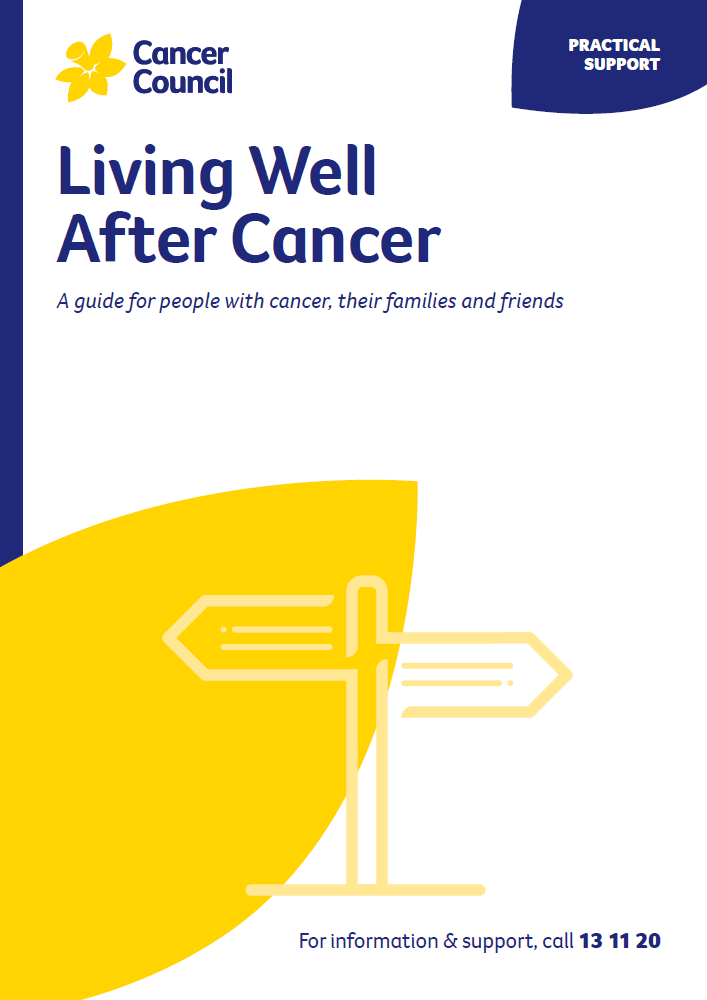- Home
- About Cancer
- Living well
- Living well after cancer
- Follow-up care
- Who do I see for follow-up care?
Who do I see for follow-up care?
You may have follow-up appointments with your cancer specialist, cancer nurse, GP or a combination. If you continue to see your specialist, you will still need to see your GP for regular health checks (e.g. blood pressure, cholesterol levels and weight). People treated for cancer may have a higher risk of other illnesses, such as heart disease and stroke, compared with the general population. Having a regular GP can help you manage your overall health and ensure you receive the support you need.
Your GP or specialist can refer you to a range of allied health professionals to help you manage some of the side effects of treatment and improve your quality of life. Ask for a referral to a professional with experience working with cancer survivors. Some people also find complementary therapies helpful.
If you have ongoing side effects after cancer treatment, talk to your GP about developing a chronic disease management plan to help you manage the condition. This means you may be eligible for a Medicare rebate for up to five visits each calendar year to allied health professionals.
Other health professionals who can help
| general practitioner (GP) | helps manage treatment side effects and may manage some surveillance tests; conducts regular health checks; provides advice about healthy lifestyle choices; manages any other physical or mental health issues you may have |
| cancer nurse specialist | provides care, information and support throughout treatment and recovery; helps with symptom management and wellbeing after treatment; liaises with other members of the treatment team |
| continence nurse | assesses and educates people about bladder and bowel control |
| counsellor, psychologist | help you manage your emotional response to treatment and recovery; can provide strategies to help you make any desired changes to your life |
| dietitian | helps with nutritional concerns, any ongoing problems with food and eating, or supervised weight loss or gain |
| exercise physiologist | prescribes exercise to help improve your overall health, fitness, strength and energy levels |
| lymphoedema practitioner | educates people about lymphoedema prevention and management; provides lymphoedema treatment |
| occupational therapist | assists in adapting your living and working environment to help you resume usual activities after treatment |
| physiotherapist | can develop a program to improve muscle strength, restore movement and help you get back to activities |
| sex therapist | helps you and your partner with sexuality issues after treatment |
| social worker | links you to support services and helps you with emotional, practical and financial issues |
| speech pathologist | helps with communication and swallowing issues; can give you strategies to help you eat and drink safely |
I now realise how important it is to build a relationship with my health care professionals and to actively look after my health.
Emma
The Australian Cancer Survivorship Centre provides resources on survivorship care plans, dealing with common survivorship issues such as fatigue, and caring for a cancer survivor. You can find these at petermac.org/cancersurvivorship.
→ READ MORE: Preparing for appointments
More resources
Prof Michael Jefford, Medical Oncologist and Director, Australian Cancer Survivorship Centre, Peter MacCallum Cancer Centre, VIC (clinical review); Lucy Bailey, Nurse Counsellor, Cancer Council Queensland; Philip Bullas, Consumer; Dr Kate Gunn, Clinical Psychologist and Senior Research Fellow, Department of Rural Health, University of South Australia, SA; Rosemerry Hodgkin, 13 11 20 Consultant, Cancer Council WA; Prof David Joske, Clinical Haematologist, Sir Charles Gairdner Hospital and Clinical Professor of Medicine, The University of Western Australia, WA; Kim Kerin-Ayres, Clinical Nurse Consultant, Cancer Survivorship, Concord Hospital, NSW; Sally Littlewood, Physiotherapist, Seymour Health, VIC; Georgina Lohse, Social Worker, GV Health, VIC; Melanie Moore, Exercise Physiologist and Clinical Supervisor, University of Canberra Cancer Wellness Clinic, ACT; June Savva, Senior Clinician Dietitian, Nutrition and Dietetics, Monash Cancer Centre, Monash Health, VIC; Dr Elysia Thornton-Benko, Specialist General Practitioner and Research Fellow, University of New South Wales, NSW; Prof Janette Vardy, Medical Oncologist, Concord Cancer Centre and Professor of Cancer Medicine, The University of Sydney, NSW; Lyndell Wills, Consumer.
View the Cancer Council NSW editorial policy.
View all publications or call 13 11 20 for free printed copies.

